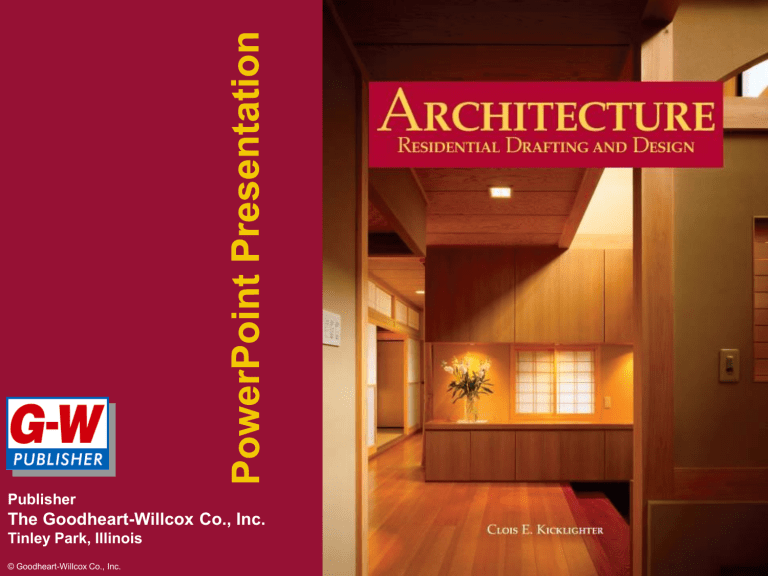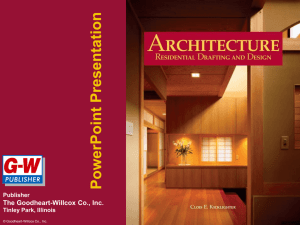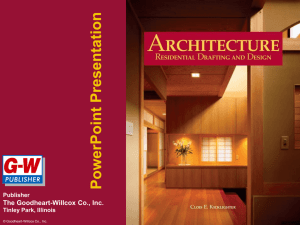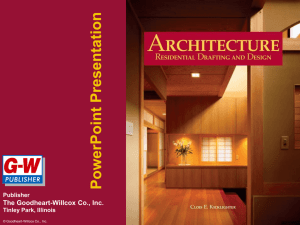Floor Plan Basics: Architectural Drafting Presentation

Publisher
The Goodheart-Willcox Co., Inc.
Tinley Park, Illinois
© Goodheart-Willcox Co., Inc.
1
Permission granted to reproduce for educational use only
Chapter 13
The Floor
Plan
© Goodheart-Willcox Co., Inc.
2
Permission granted to reproduce for educational use only
The Floor Plan
• The floor plan is the heart of a set of construction drawings.
– All tradeworkers refer to the floor plan.
– Usually the first drawing completed.
– The basis for many other plans.
– Actually a section drawing.
• Keep the floor plan clean and uncluttered.
3
© Goodheart-Willcox Co., Inc.
Permission granted to reproduce for educational use only
Required Information
• Information that should be included on the floor plan includes:
– Location of Exterior and interior walls.
– Size and location of windows and doors.
– Location of Stairs.
– Room names.
– Materials used (Material symbols).
– Location and size dimensions.
(continued)
4
© Goodheart-Willcox Co., Inc.
Permission granted to reproduce for educational use only
© Goodheart-Willcox Co., Inc.
Required Information
– Drawing scale.
– Built-in cabinets and appliances.
– Location of Permanent fixtures.
– Location of Fireplaces and Chimneys.
– Walks, patios, and decks.
– Related structures are frequently included.
5
Permission granted to reproduce for educational use only
Location and Size of Walls
• Walls should be drawn actual thickness.
• Since the floor plan is a section drawing hatch patterns (symbols) should be used to indicate materials.
6
© Goodheart-Willcox Co., Inc.
Permission granted to reproduce for educational use only
Wall Material Symbols
© Goodheart-Willcox Co., Inc.
7
Permission granted to reproduce for educational use only
Windows and Doors
• Use a centerline to locate the opening for windows and doors in frame walls.
• Dimension to the side of the opening in a masonry wall.
• Openings for windows are sash width.
• Openings for doors are actual width.
• Door swing should be indicated.
8
© Goodheart-Willcox Co., Inc.
Permission granted to reproduce for educational use only
Window and Door Location
• Windows and doors should be located in a frame wall using a centerline. Door swing is also shown.
9
© Goodheart-Willcox Co., Inc.
Permission granted to reproduce for educational use only
Stairs and Fireplaces
• Only information about the basic size and location of stairs and chimneys needs to be recorded on the floor plan.
• For stairs, show direction of flight, number of risers, and width of stairs.
• For a chimney, show basic depth and width, opening design, and location.
10
© Goodheart-Willcox Co., Inc.
Permission granted to reproduce for educational use only
Stairs on Floor Plan
• Information about a set of stairs that is usually included on the floor plan.
11
© Goodheart-Willcox Co., Inc.
Permission granted to reproduce for educational use only
Walks, Patios, and Decks
• Several outside features are usually included on the floor plan.
• Walks, patios, and decks are examples.
• Indicate size and materials on the plan.
• Consider these elements as part of the total plan.
12
© Goodheart-Willcox Co., Inc.
Permission granted to reproduce for educational use only
Room Names
• Room names help communicate the plan to others.
• Room names should be 3/16" high.
• Room names should be in the center of the room.
13
© Goodheart-Willcox Co., Inc.
Permission granted to reproduce for educational use only
Material Symbols
• Material symbols or material hatch patterns are used to denote each material.
• Use a material symbol whenever the material should be identified.
• If the symbol is not a standard one, identify it.
14
© Goodheart-Willcox Co., Inc.
Permission granted to reproduce for educational use only
Material Symbols
© Goodheart-Willcox Co., Inc.
15
Permission granted to reproduce for educational use only
Material Symbols
© Goodheart-Willcox Co., Inc.
16
Permission granted to reproduce for educational use only
Dimensioning
• Dimensions on a floor plan show size and location of the features.
• Proper placement of dimensions requires good judgment.
• Locate dimensions where one would logically look for them.
• In architectural drafting, dimension lines are continuous lines with the dimension figure placed above the line.
17
© Goodheart-Willcox Co., Inc.
Permission granted to reproduce for educational use only
Dimensioning
• Dimension figures are always parallel to the dimension line (aligned).
• Be consistent with the type of termination symbol used for dimension lines.
• Move dimension lines out from drawing.
• Space dimension lines 1/4" or 3/8" apart.
• Make leaders no longer than 2".
18
© Goodheart-Willcox Co., Inc.
Permission granted to reproduce for educational use only
Dimensioning
• Dimensions are recorded in feet and inches.
• Feet and inch marks may be omitted.
• Dimensions less than 1' are usually indicated as 1/2", 2", 6", etc.
• Dimension interior frame walls to the center of the wall.
• Dimension exterior frame walls to the outside of the stud wall.
19
© Goodheart-Willcox Co., Inc.
Permission granted to reproduce for educational use only
Dimensioning
• Recommended method of dimensioning frame wall construction.
20
© Goodheart-Willcox Co., Inc.
Permission granted to reproduce for educational use only
Dimensioning
• Solid masonry walls (cast concrete, block, brick, or stone) are usually dimensioned as shown.
21
© Goodheart-Willcox Co., Inc.
Permission granted to reproduce for educational use only
Dimensioning
• Brick veneer walls are dimensioned to the outside of the stud wall.
• Solid masonry walls are dimensioned to the outside of the wall.
• Overall dimensions are needed to provide the total length and width of the structure or major parts of the structure.
22
© Goodheart-Willcox Co., Inc.
Permission granted to reproduce for educational use only
Dimensioning
• Add up partial dimensions to be sure they equal the overall dimensions.
• Notes are often necessary to present information that cannot be represented by dimensions or symbols.
• Notes should be read from the bottom of the sheet.
23
© Goodheart-Willcox Co., Inc.
Permission granted to reproduce for educational use only
Scale and Sheet Identification
• Residential floor plans are usually drawn at 1/4" = 1'-0".
• C-size paper is generally large enough.
• Number the sheets in the package.
– Sheet 1 of 6, 2 of 6, etc., works well.
– Sheet numbers should be placed in the lower right-hand corner.
24
© Goodheart-Willcox Co., Inc.
Permission granted to reproduce for educational use only











